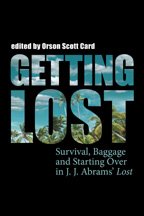Lost in 'Lost'
Lost is featured in the May 10th issue of USA Today:
Lindelof and Cuse, speaking from Lost's Hawaii set last week as they wrapped up Season 2 and outlined Season 3, say there are too many questions for a simple explanation. "We know where they're at and what's going on, but that wouldn't qualify as a unifying theory," Lindelof says. Numerous questions yield multiple answers, they say.
"One layer speaks to electromagnetism, another to psychological experimentation, another to why they can see Walt. Coming up with one answer that unifies all those things is next to impossible. Hopefully, every sublayer will be explained" by the end, they say.
One of the best things about Lost is that the more general theories -- Island as purgatory, or Island as psychological test -- are effectively true, whatever the specific answers turn out to be. The characters are being tested, whether by accident or design, and islands have, from the earliest myths to Shakespeare's The Tempest and on through today, functioned as microcosms of society and the collective unconsciousness.
The article goes on to talk about Getting Lost, the upcoming essay collection in which I theorize that Lost functions as a group meditation along the lines of Descartes' seminal Meditations on First Philosophy:
With speculation comes disagreement, which may be half the fun. Orson Scott Card, author of the best-selling Ender's Game science-fiction series, says a collective-consciousness theme would turn whatever solid ground viewers can count on into quicksand. "One thing we're counting on is that the back stories are true," says Card, who is editing an upcoming book of essays, Getting Lost: Survival, Baggage and Starting Over in J.J. Abrams' Lost, due in August.
Lost may be teasing viewers at times, too. Producers say it isn't purgatory, but the name Gary Troup is an anagram for that transitional realm, Porter says.
Lost's many literary and philosophical allusions don't provide specific explanations, but they offer a cornucopia of considerations. Characters bear the names of famed philosophers Locke and Rousseau. The novel Watership Down is about rabbits that must flee their warren, and tesseracts, or time ripples, are found in A Wrinkle in Time, two of the many books read on the island.
An Ambrose Bierce story on Lost's reading list, An Occurrence at Owl Creek Bridge, toys with the snow-globe theory, telling the story of a man who thinks he has escaped hanging only to find it occurred in his own mind just before he is hanged. But Lavery points to Bierce's The Damned Thing, which is about an invisible monster.
Other essayists cite philosopher Francis Bacon and mathematician René Descartes in their musings. "I think Lost, more than anything else on TV to date, provides a forum for philosophical and critical discussion," says Amy Bauer, an assistant professor of music at the University of California-Irvine who moderates a peer-reviewed online journal, The Society for the Study of Lost (www.loststudies.com).
Everything about Lost is designed for analysis, says Joyce Millman, who wrote one of the Getting Lost essays. She credits the writers with "a rich variety of references: scientific, biblical, pop-cultural, literary, historical, philosophical."
Millman, whose essay is called Game Theory, sees Lost's structure attracting fans via familiarity: She thinks it works like an interactive video game. "The story line and the action develop on multiple levels. There are hidden clues that function like the Easter eggs in gaming," Millman says. "Lost is a big game, and the act of watching it forces you to play along."
I would be remiss if I failed to mention that Getting Lost is currently available for pre-order at Amazon.com, Chapters.ca, and Amazon.ca.
 ...theories...
...theories...


0 Comments:
Post a Comment
Subscribe to Post Comments [Atom]
<< Home